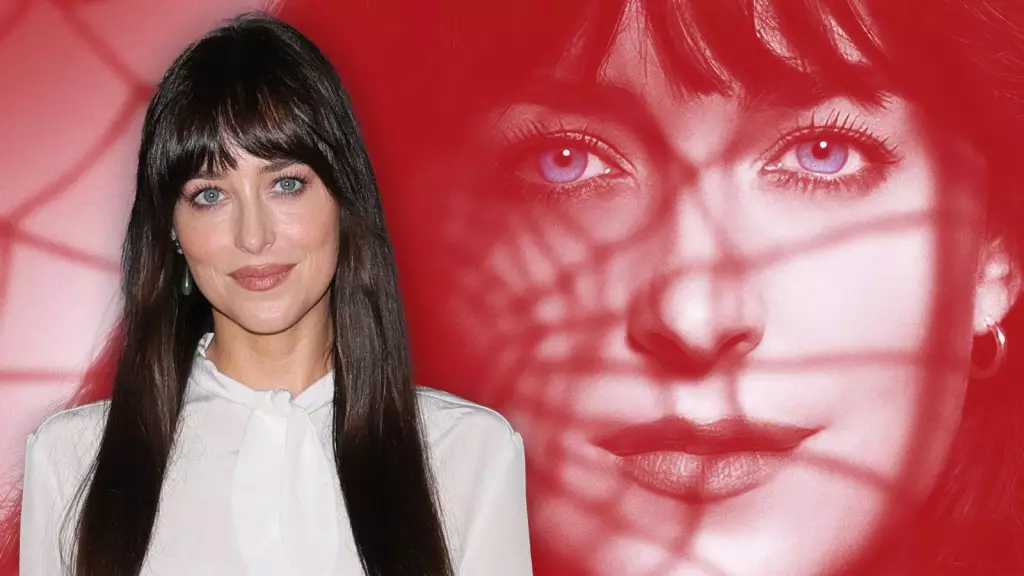In a cinematic landscape increasingly plagued by superhero fatigue, Dakota Johnson’s performance in “Madame Web” has ignited a passionate discourse surrounding the film’s unexpected underperformance. The box office figures tell a stark story: the film, which boasted a budget of $80 million, managed to generate a mere $51.5 million worldwide. This tale of financial disappointment highlights not just the pitfalls of the superhero genre, but also the complexities of creative control within the industry—a theme Johnson poignantly addressed in her recent interviews.
The Voices Behind the Scenes: A Challenge for Creativity
Johnson’s critical viewpoint sheds light on a pervasive issue within Hollywood today: the tendency for creative decisions to be made by those with little artistic inclination. “Madame Web,” she argues, fell victim to this bureaucratic cycle, morphing into something markedly different from its original conception. This sentiment is echoed by many within the industry who lament the power dynamics at play in filmmaking. The idea that a project can start with a unique vision yet be diluted through committee-driven decisions is a troubling trend that jeopardizes the integrity of artistic storytelling.
Johnson’s indictment of the committee mindset is not merely a critique but an urgent plea for a return to genuine artistry. “It’s really hard to make art that way,” she remarked, encapsulating the difficulty artists face when at the mercy of corporate interests. The dichotomy between creativity and commerce is ever-present, and for actors like Johnson, navigating this terrain can lead to disillusionment.
A Learning Experience Amidst the Chaos
While “Madame Web” did not resonate as intended, Johnson reveals a profound willingness to learn from the experience. In a candid conversation, she expressed that participation in a such a project has not deterred her from future ambition. Instead, she acknowledges the importance of personal growth within the context of professional setbacks. Johnson’s assertion that she does not harbor resentment for past projects speaks volumes of her character. “Who cares?” she said, reminding us that each experience, even negative ones, contribute to an actor’s craft.
Nevertheless, the realizations she garnered from “Madame Web” instilled a sense of pragmatism regarding her future projects. Her candid confession that she probably won’t dive into another superhero flick underscores a significant turning point in her career. It brings to light the broader reality that not every actor is suited for every role, regardless of the project’s financial backing or its original promise.
The Role of Media and Public Perception
As “Madame Web” struggles in the wake of scathing reviews, the role of media scrutiny becomes a pivotal factor in shaping public perception. Sony Pictures CEO Tony Vinciquerra’s defense of the film highlighted another layer of complexity; while critics were harsh, audience reactions on platforms like Netflix painted a contrasting picture. This discrepancy raises fundamental questions about how media narratives can influence a film’s life beyond its box office performance.
Critically, Vinciquerra’s remarks about the adverse effects of press critique serve as a reminder of the power wielded by critics. While reviews can inform audience decision-making, they can also unjustly doom a project before it has a chance to build its own following. This phenomena isn’t limited to “Madame Web”; it reverberates across many cinematic releases that diverge from mainstream expectations but may still resonate deeply with viewers.
The Future of Superhero Films: A Call for Authenticity
As the superhero genre evolves alongside changing audience tastes, Johnson’s insights serve as a microcosm of a larger industry transformation. The pressing need for authenticity and genuine creative endeavors in this all-consuming genre cannot be overstated. Rather than succumbing to cookie-cutter formulas dictated by market research, filmmakers must strive to balance commercial viability with artistic integrity.
The landscape may be littered with both triumphs and flops, but the lessons learned from experiences like “Madame Web” can guide future projects towards a more genuine representation of storytelling. Johnson’s truthful reflections not only highlight the current state of affairs but also ignite hope for a future where creativity reigns supreme, undiluted by the fears of marketability.


Leave a Reply